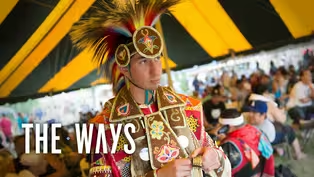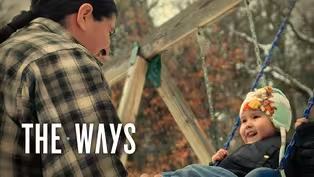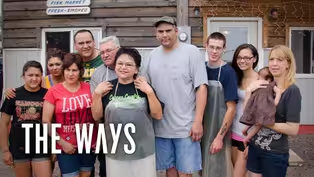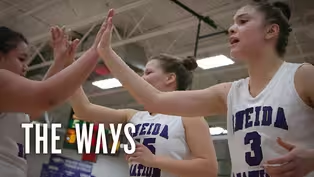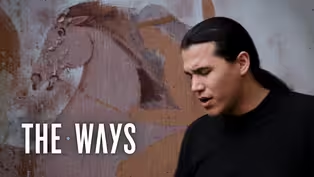The Ways
Waadookodaading
Special | 4m 47sVideo has Closed Captions
Waadookodaadiing educators integrate sugaring traditions for Ojibwe language learning.
Waadookodaading, “a place where people help each other,” is an Ojibwe immersion school that integrates the tradition of sugaring into the curriculum. Learn how Keller Paap, a teacher, and Brooke Ammann, the school director, demonstrate the importance of students learning the Ojibwe language in this way.
Problems playing video? | Closed Captioning Feedback
Problems playing video? | Closed Captioning Feedback
The Ways is a local public television program presented by PBS Wisconsin
Educator resources with standards alignment and extension activities are available on the PBS Wisconsin Education website.
The Ways
Waadookodaading
Special | 4m 47sVideo has Closed Captions
Waadookodaading, “a place where people help each other,” is an Ojibwe immersion school that integrates the tradition of sugaring into the curriculum. Learn how Keller Paap, a teacher, and Brooke Ammann, the school director, demonstrate the importance of students learning the Ojibwe language in this way.
Problems playing video? | Closed Captioning Feedback
How to Watch The Ways
The Ways is available to stream on pbs.org and the free PBS App, available on iPhone, Apple TV, Android TV, Android smartphones, Amazon Fire TV, Amazon Fire Tablet, Roku, Samsung Smart TV, and Vizio.
More from This Collection
The Ways is a collection of language and culture stories from Wisconsin Native communities. Featured in this compilation: Lady Thunderhawks, Waadookodaadiing, Living Language, Powwow Trail, Prayers in a Song and Lake Superior Whitefish.
Video has Closed Captions
Dylan Jennings of the Bad River Band of Lake Superior Chippewa gives insight into powwows. (4m 46s)
Video has Closed Captions
Ron Corn Jr. hopes his daughter will be a first-language Menominee speaker. (5m 8s)
Video has Closed Captions
The Petersons are part of a long tradition of commercial fishing in Lake Superior. (3m 51s)
Video has Closed Captions
Jessica House of the Oneida Nation leads the high school basketball team by example. (3m 22s)
Video has Closed Captions
Tall Paul of the Leech Lake Band of Ojibwe raps about language and Native identity. (4m 2s)
Providing Support for PBS.org
Learn Moreabout PBS online sponsorship[singing in Ojibwe] ["Prayer Loop Song" by Supaman] - Man: We knew that the number of existing elders who spoke Ojibwe fluently, who were raised with Ojibwe as a first language, were vastly diminishing.
So we knew we had to do something quick.
That's why we started "Waadookodaading."
[speaking Ojibwe] - Woman: Waadookodaading, it's a place where our language lives, where the Ojibwe language lives.
[speaking Ojibwe] ["Prayer Loop Song" by Supaman] - Man: Language-- I think with any cultural practice, it has a specific vocabulary and teachings that are associated with each activity in that practice.
So for instance, all the words about boiling sap, the way that it boils, have specific terms that describe it very, very accurately and allow you to develop a deep comprehension of the activity and why you do it and how you do it.
[speaking Ojibwe] [children singing in Ojibwe] I always say it's an educational experience for students, but it's a community movement.
We're facing some really unique challenges right now.
- Woman: We have a lot of statistics that are against us.
We have a lot of issues with abuse and suicide, that show us as not being the most healthy of communities.
And I always think of it, not just in terms of our culture surviving, but really, our people surviving.
[speaking Ojibwe] - Man: I didn't learn to speak Ojibwe as a child, but when I started studying it as an adult in college, I quickly realized how much knowledge and capacity there is in a language to know who you are, where you come from, how to see the world in that unique way.
[speaking Ojibwe] It's certainly academically rigorous.
It's not just a culture program.
It's not just a language program.
[speaking Ojibwe] Ultimately, it's prepping them and building an intellectual framework that they'll be able to apply to and adapt to, no matter where they are in the world, that will help them.
And I think they're prepared with knowledge and ability that they feel proud of, that they feel connected to their ancestry in a deeper way.
They have a much broader and deeper understanding of Ojibwe perspective in relation to the local community, the local environment, and the world.
[vocable singing]
Support for PBS provided by:
The Ways is a local public television program presented by PBS Wisconsin
Educator resources with standards alignment and extension activities are available on the PBS Wisconsin Education website.
